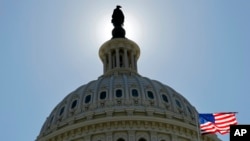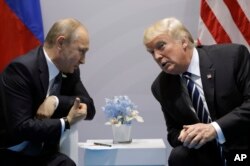The U.S. House of Representatives is likely to approve new sanctions Tuesday against Russia for its meddling in last year's presidential election, at the same time giving Congress new powers to review any attempt by President Donald Trump to ease penalties imposed on Moscow.
The Senate has already overwhelmingly approved its version of the legislation. In both chambers, lawmakers are calling for a 30-day period to vote on any Trump move to curtail sanctions on Russia, such as former president Barack Obama's closure of two Russian compounds in the U.S. in response to the election interference.
Trump has objected to the provision keeping him from taking unilateral action on easing the Russian sanctions as he attempts to foster a friendlier relationship with President Vladimir Putin. It is unclear whether he will sign the legislation or veto it, risking a congressional vote to override a veto. The final version of the legislation is also expected to include sanctions against Iran and North Korea.
White House press secretary Sarah Huckabee Sanders told reporters Monday that Trump is "looking over where it stands exactly at this point. I think the important part of this is that the president very much supports sanctions on those countries and wants to make sure that those remain but at the same time wants to make sure that we get good deals. Those two things are both very important for the president."
The Senate passed its version on a 98-2 vote and the House is expected to approve its measure by at least a veto-proof two-thirds majority. The two chambers would have to reconcile the differences in their bills before sending the measure to Trump.
One Democratic lawmaker supporting the sanctions measure, Congressman Jerrold Nadler of New York, told VOA, "By all evidence the Russian government interfered in our elections and tried to help Mr. Trump and we cannot permit that. We have to say to any foreign power, it's not your business to interfere in our elections."
Reaching across the isle
In a rare show of bipartisanship in politically fractious Washington, key Republican and Democratic lawmakers reached accord last weekend on the legislation.
The votes on the sanctions are occurring amidst months of investigations into Russian interference in the election, which the U.S. intelligence community concluded was personally directed by Putin, a claim he has rejected.
Trump has been largely dismissive of numerous investigations underway in the U.S. about Russian meddling in the election aimed at helping him win, repeatedly calling the probes a "witch hunt." But the legislation would require him to submit a report to Congress explaining his reasons for wanting to ease or terminate any sanctions against Moscow.
New White House communications director Anthony Scaramucci, reflecting Trump's views, told CNN on Sunday, "The Russia thing is a complete bogus and nonsensical thing."
Scaramucci, named last week as one of Trump's top advisers, said the president remains uncertain whether Russia hacked into computer files at the Democratic National Committee headquarters in Washington and then released thousands of emails through the anti-secrecy group WikiLeaks to damage Trump's challenger, Democrat Hillary Clinton.
Numerous congressional panels are interviewing Trump campaign aides about possible links to Russian interests. Special Counsel Robert Mueller is conducting a criminal probe whether the Trump campaign illegally colluded with Moscow and whether Trump obstructed justice by firing James Comey, the former Federal Bureau of Investigation director who was heading the Russia probe before Mueller took over.
VOA Ukrainian service reporter Myroslava Gongadze contributed to this report





